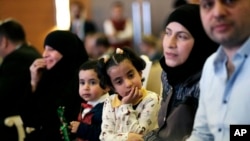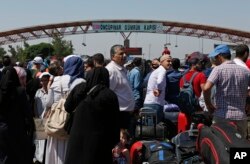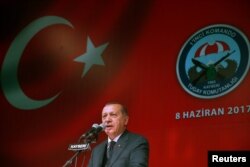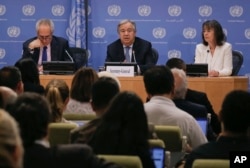This U.N. World Refugee Day sees Turkey designated for the third consecutive year as the country that hosts the most refugees.While Ankara continues to stand by its policy of welcoming refugees, tensions within the country appear to be on the rise.
On Sunday, a factory dispute involving the factory owner and Syrian employees triggered rising hostilities between Syrians and Turks, along with violence that raged into the night in a suburb of the western city of Sakarya.
3 million Syrians in Turkey
There appears to be little remorse among some of those who took part in the violence.
“These Syrians attacked the factory buses and burned down cars,” explained one young man who was on the scene. “We also heard that the Syrians harassed girls, so me and a number of Turks came together, walked to a Syrian neighborhood and started to beat whomever came our way. Then we went to another area and beat more people. Some had their faces really quite damaged. Then the police came and we got beaten by them.”
The majority of the 3 million Syrians in Turkey live outside refugee camps. Many eke out a living in the main cities and the more prosperous western provinces.
Open threats to Syrians
Most cities and towns now have large Syrian populations and in many of them, tensions have been rising for some time.
“We have witnessed in different neighborhoods in Istanbul, but also in the south of Turkey, where the Syrians are concentrated, in fact, there are very open threats to the Syrians,” warned Professor Ahmet Icduygu, an expert on migration at Istanbul's Koc University. “There were fights going and discrimination going on. And there is already debate, like in other Western countries, that they are taking our jobs, and also quite direct attacks to the Syrians, etcetera, still there ... a kind of tension growing.”
Ankara's policy of providing welfare to the refugees, including free health care and education, also has added to the resentment.
“They [Syrians] are getting some privileges that Turks don't get, such Syrian students can go directly to university without paying,” notes Icduygu. President Recep Tayyip Erdogan said the cost to Turkey of hosting the refugees had surpassed $25 billion.
Tensions are now being exacerbated by rising unemployment — particularly among the young — running at more than 23 percent, which is close to being decade high.
Stabbing death results in riots
Last month, Istanbul, which is home to the largest Syrian population, witnessed some of the worst violence. Days of violent clashes against Syrians in an Istanbul suburb occurred after Syrian and Afghan refugees allegedly stabbed to death a Turkish youth who was trying to prevent the youngsters from harassing a girl. The violence was only quelled by a large police intervention involving water-cannon trucks and armored cars, and the evacuation of scores of Syrians from the district.
Salih Arslan, the uncle of the murdered Turkish youth, voiced frustration that the concerns of Turkish residents are being ignored.
“These incidents and events happen all the time, though we always make complaints, nobody stops them,” said Arslan.
“On Sundays we can't go and sit in the parks with our families. Syrians come in groups of 20 to 30 and then you feel yourself in the middle of an Arab country. They stabbed the heart of my young nephew. And those who commit these crimes go without punishment because these people don't even have registration papers,” he added.
Arabic signs removed
In the southern city of Adana, authorities have removed many Arabic signs in a bid to lower the visible presence of Syrians, but the government defends its policy of offering sanctuary, with Foreign Minister Mevlut Cavusoglu vowing no change in policy.
Erdogan's foreign affairs spokesman tweeted, "On this #WorldRefugeeDay, Turkey hosts the largest number of refugees in the world. This is not a burden but a badge of honor for us.”
But with thousands of refugees returning to Syria, albeit temporarily for the coming Eid religious holiday, analysts suggest that Ankara is hoping this could be a sign the burgeoning refugee crisis might be starting to ease.







